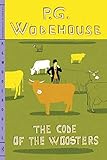After my grandmother died, all I could do was read P.G. Wodehouse.
She had always been a fan, and while various relatives squabbled about who should inherit which silver teapot and why, I quietly made off with her collection of orange-spined paperbacks, taking with me Bertram Wilberforce Wooster – vapid but amiable young clubman of early-20th century England — and his peerless gentleman’s personal gentleman, Reginald Jeeves.
Evelyn Waugh famously said of Wodehouse’s fiction and its characters:
Their desperate, transitory, romantic passions are unconnected with the hope or fear of procreation; age in their world is usually cantankerous, extreme youth, obnoxious; they all live, year after year, in their robust middle twenties; their only sickness is an occasional hangover.
To my knowledge, no one ever dies in Wodehouse – there’s no real pain or suffering, no real consequences at all. If Madeline Basset breaks her engagement to Gussie Fink-Nottle, there will be no lasting sorrow or heartbreak. And if Madeline turns her attentions toward young Bertie, we all know that no matter how knotty the imbroglio Jeeves will save the day.
Another thing about Wodehouse – and something my wife is fond of noting — you can pretty much turn to any page of any book and find a sparkling sentence. To wit:
I’m not absolutely certain of my facts, but I rather fancy it’s Shakespeare who says that it’s always just when a fellow is feeling particularly braced with things in general that fate sneaks up behind him with a bit of lead piping.


 For months I escaped into The Inimitable Jeeves, Joy in the Morning, Thank You, Jeeves – the same yellowed books my grandmother had read, most likely sitting up in bed, an ill-tempered Jack Russell at her feet, a glass of sherry within arm’s reach.
For months I escaped into The Inimitable Jeeves, Joy in the Morning, Thank You, Jeeves – the same yellowed books my grandmother had read, most likely sitting up in bed, an ill-tempered Jack Russell at her feet, a glass of sherry within arm’s reach.
But soon reading Wodehouse wasn’t enough: I listened to audio editions of the short stories read by Martin Jarvis while doing the dishes; I downloaded BBC full-cast radio dramas and listened to them at work; I binge-watched Hugh Laurie and Stephen Fry’s Jeeves & Wooster; I even read Jeeves & the Wedding Bells, the only pastiche fully authorized by the Wodehouse estate.

 I had developed a full-blown Wodehouse Addiction. And it takes no advanced degree in psychology – no call need be placed to noted nerve specialist and Bertie Wooster antagonist Sir Roderick Glossop — to identify the void Jeeves and Wooster were filling.
I had developed a full-blown Wodehouse Addiction. And it takes no advanced degree in psychology – no call need be placed to noted nerve specialist and Bertie Wooster antagonist Sir Roderick Glossop — to identify the void Jeeves and Wooster were filling.
Due to a significantly less-than-ideal home life – the sort of thing Wodehouse would never have touched upon in his fiction – I spent much of my childhood at my grandparents’ house. Most of my fondest early memories take place in and around that vast white Victorian with the secret passageway between bedrooms.
The house now sits empty and for sale. But for the better part of my youth, a trip to my grandparents was like something straight out of Wodehouse. At their house, almost anything could and did happen: cars burst into flame in the driveway; strange neighbors fed cat food to small, unsuspecting children; massive vats of ice cream fell off passing trucks; uncles cracked nephews over the head with glass ashtrays; dead shark carcasses turned up in the muddy brook; and strange and distant relatives were always stopping by and helping themselves to my grandfather’s single malt: various great aunts and second uncles and cousins thrice removed with unfortunate names like Otis McNutt Sr., Otis McNutt Jr., Otis McNutt III.
While my grandmother and the weird, wonderful world she created are gone now, I like to think I visited her again – that I can always visit her — in the pages of P.G. Wodehouse.
 But retreating to Wodehouse Land for months at a time does present certain problems. Chiefly that the world goes on without you. And one day you look up from your copy of The Code of the Woosters to discover you’re suddenly the father of a rather charming infant daughter, that you’ve become an uncle, that you’re possibly too old for shoulder-length hair, and that the country has elected president the real-life equivalent of that consummate Wodehousian villain, the “amateur dictator” Roderick Spode.
But retreating to Wodehouse Land for months at a time does present certain problems. Chiefly that the world goes on without you. And one day you look up from your copy of The Code of the Woosters to discover you’re suddenly the father of a rather charming infant daughter, that you’ve become an uncle, that you’re possibly too old for shoulder-length hair, and that the country has elected president the real-life equivalent of that consummate Wodehousian villain, the “amateur dictator” Roderick Spode.
Well, what do you do then?
As far as I can figure, you put down that book, you scoop up that charming daughter, and you move forward. And if you’re lucky, you can make for her a place half as magical as the white Victorian by the cove that you knew once upon a time.
More from A Year in Reading 2016
Don’t miss: A Year in Reading 2015, 2014, 2013, 2012, 2011, 2010, 2009, 2008, 2007, 2006, 2005









